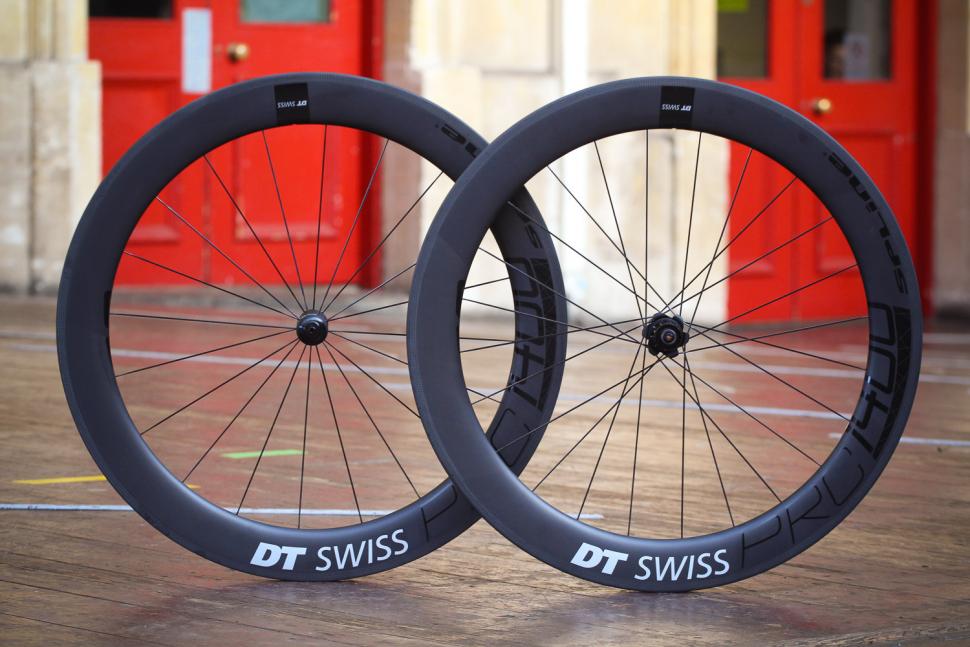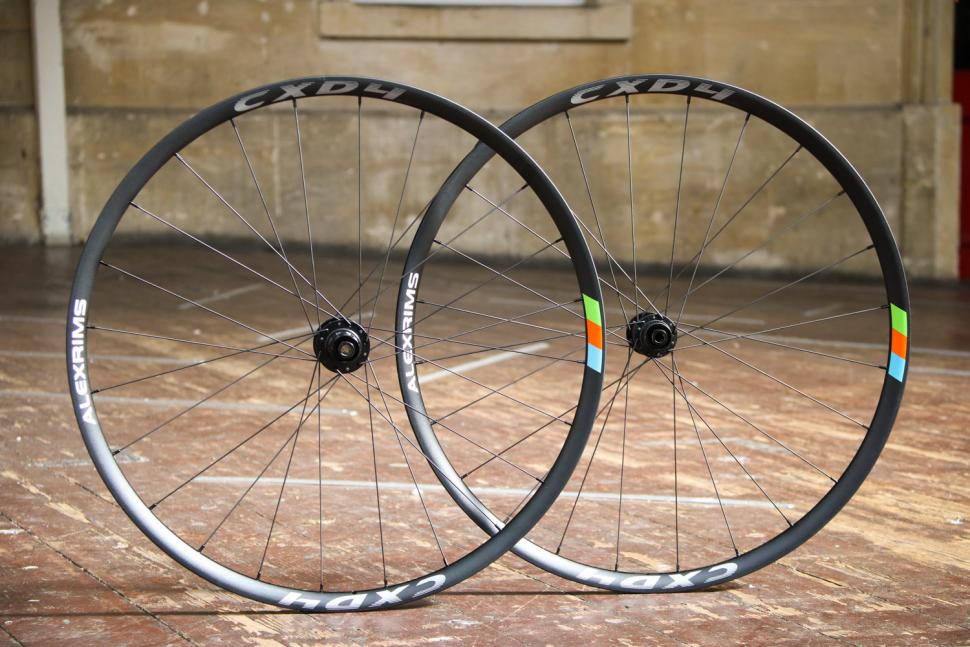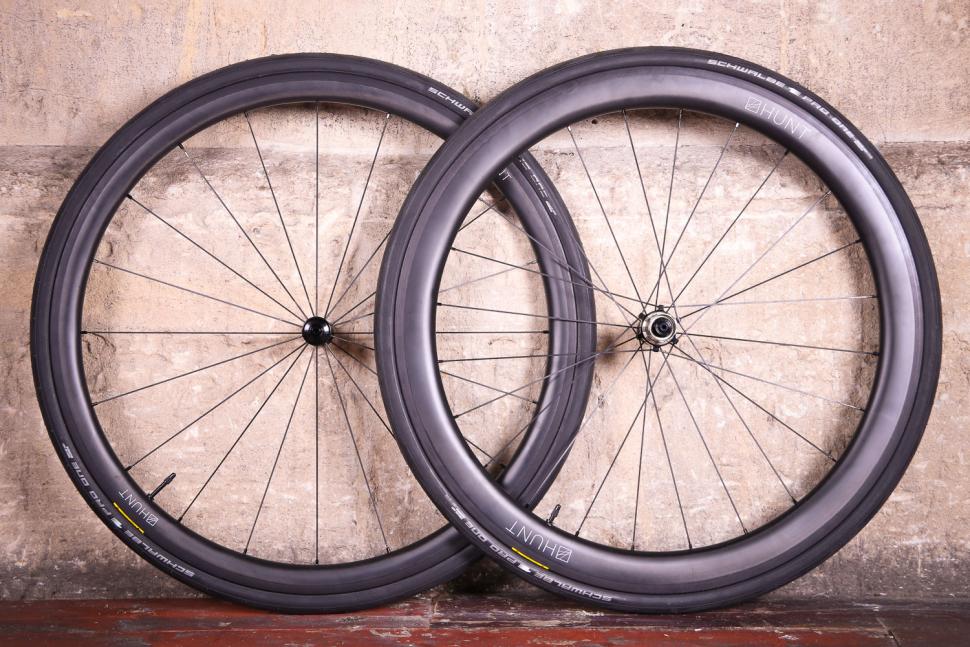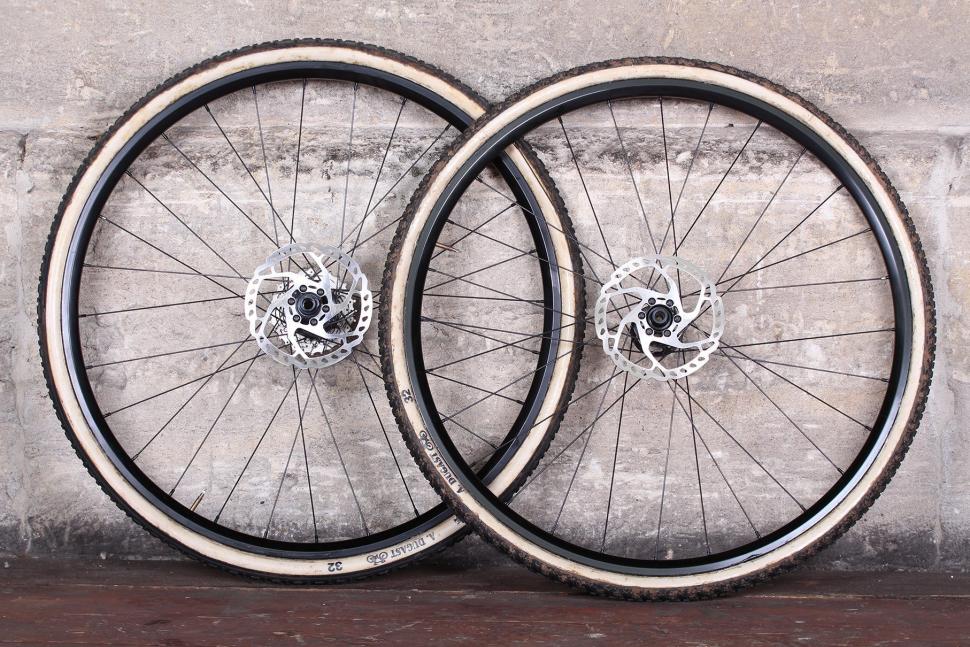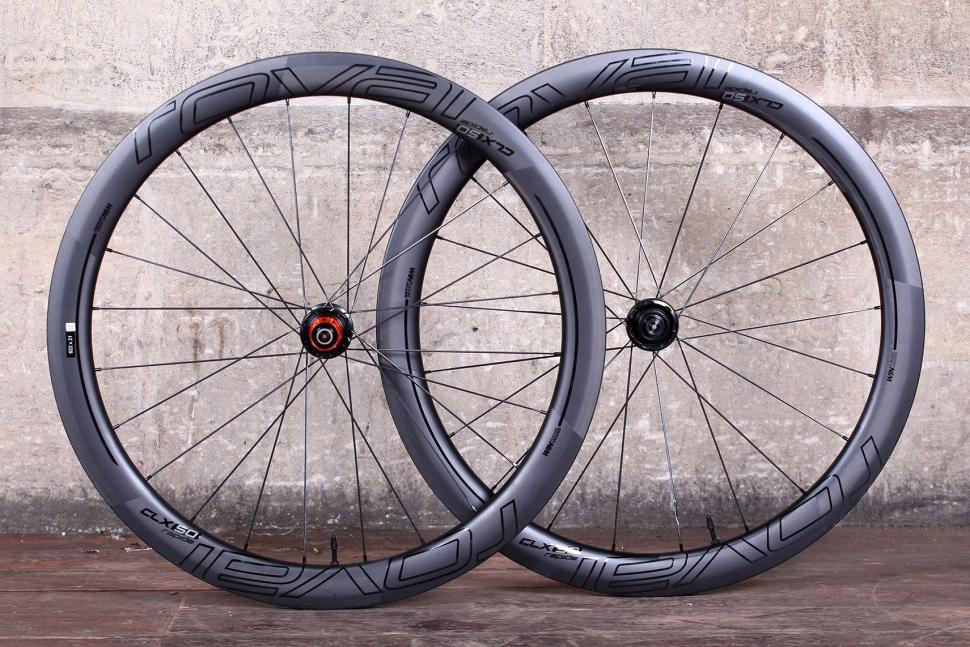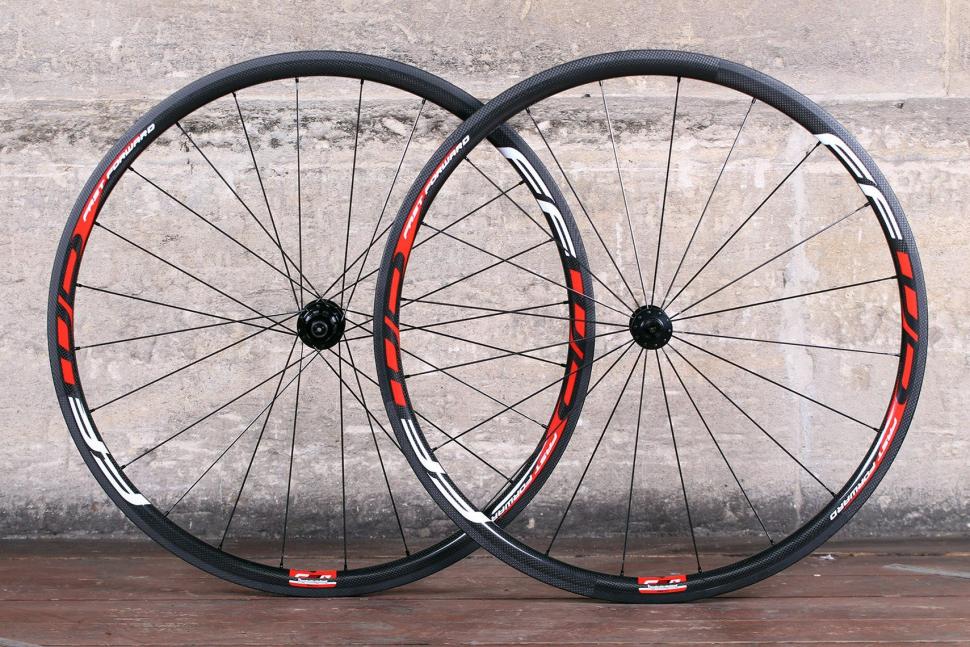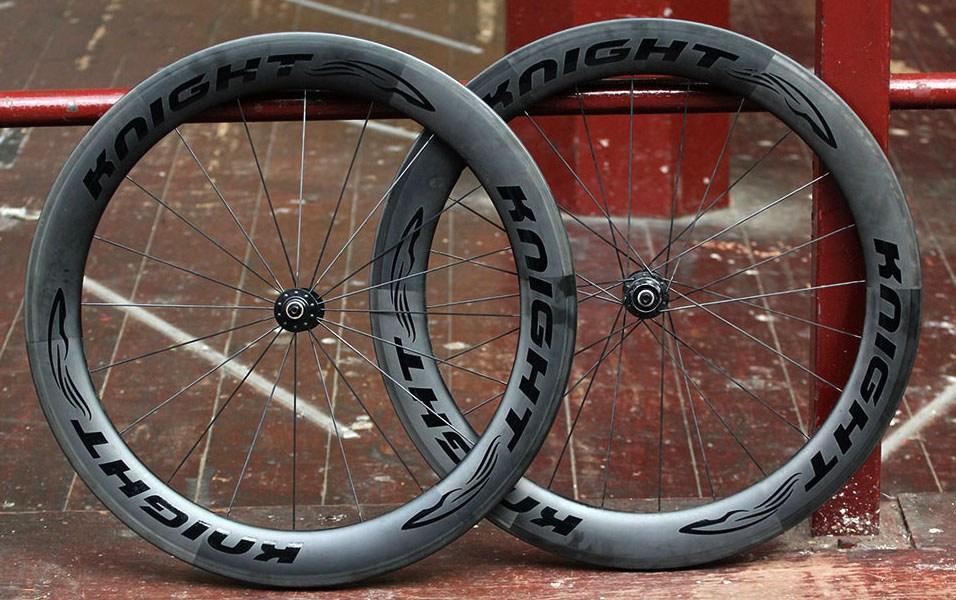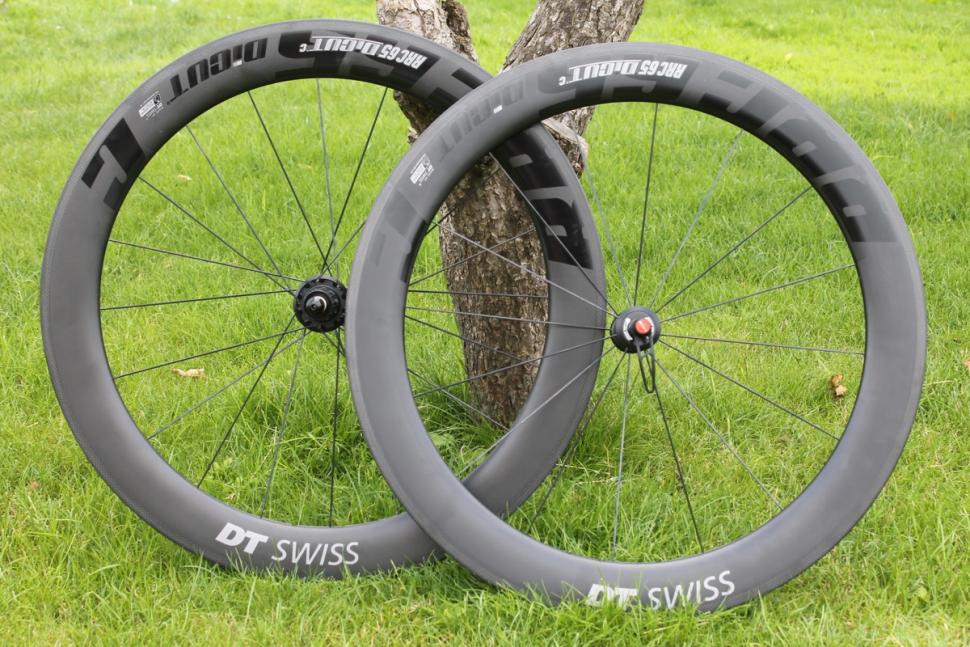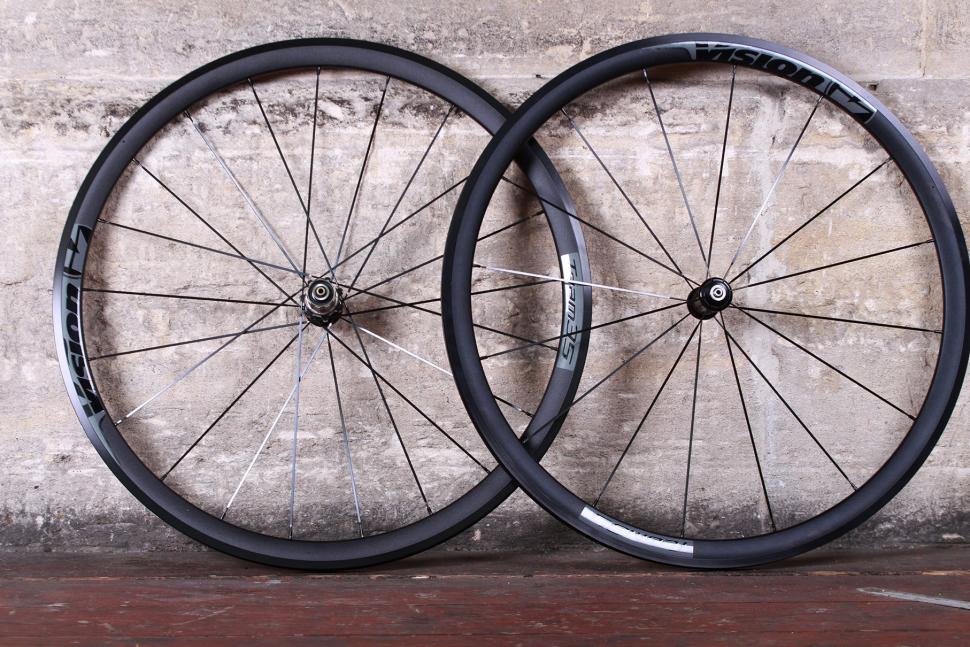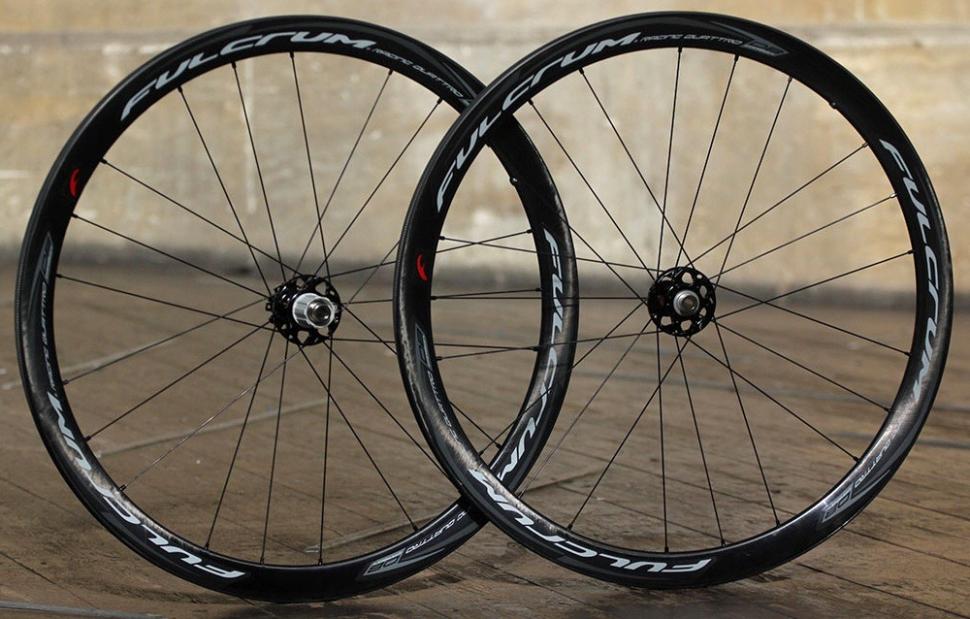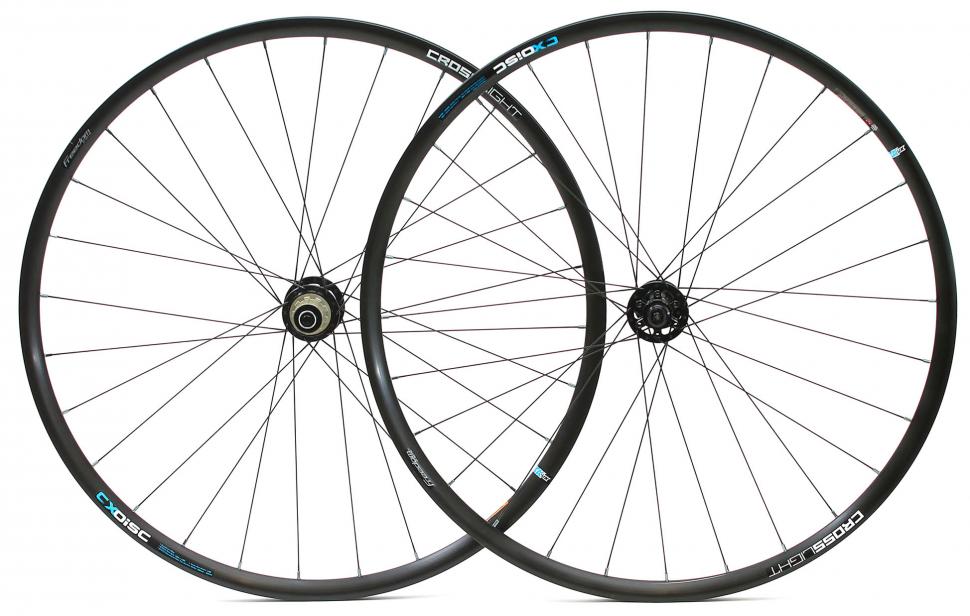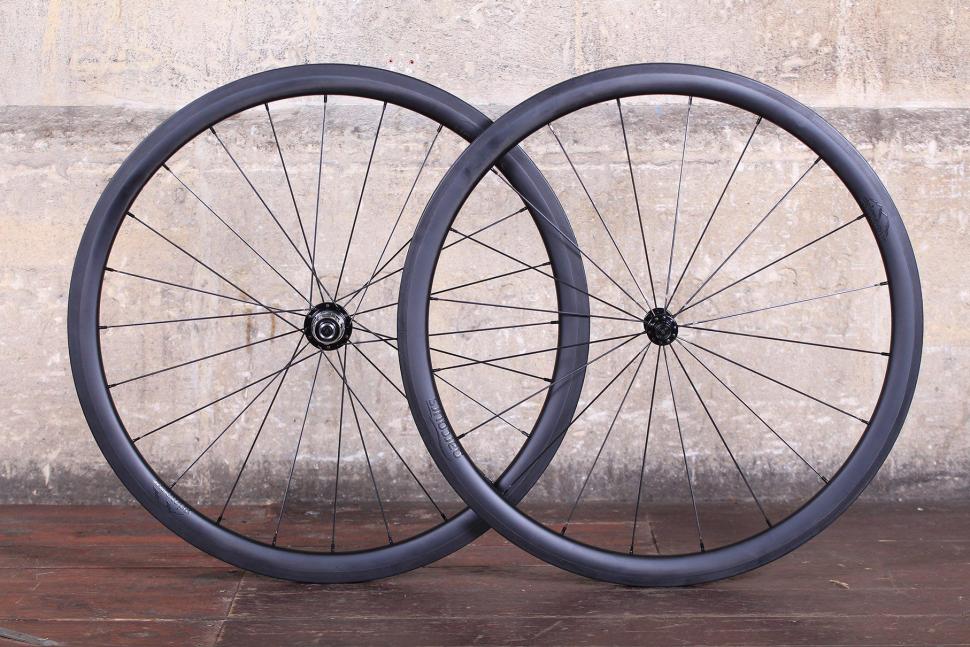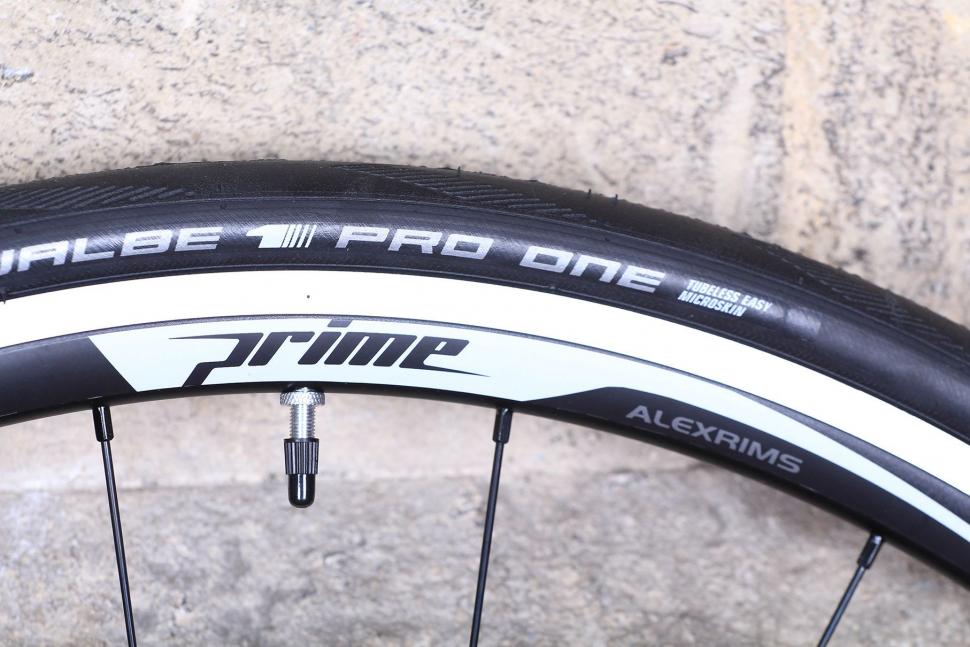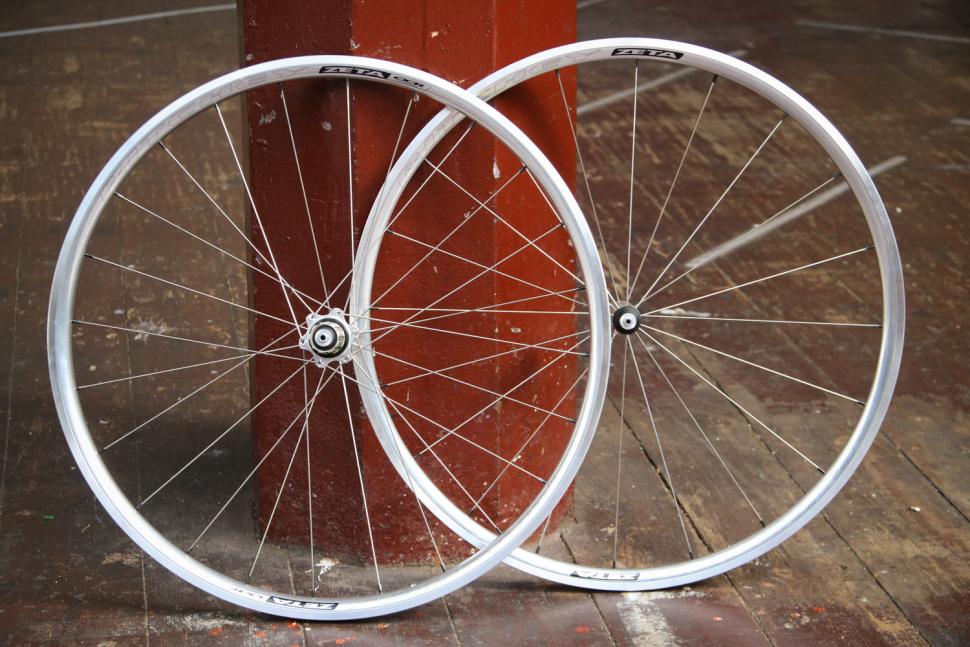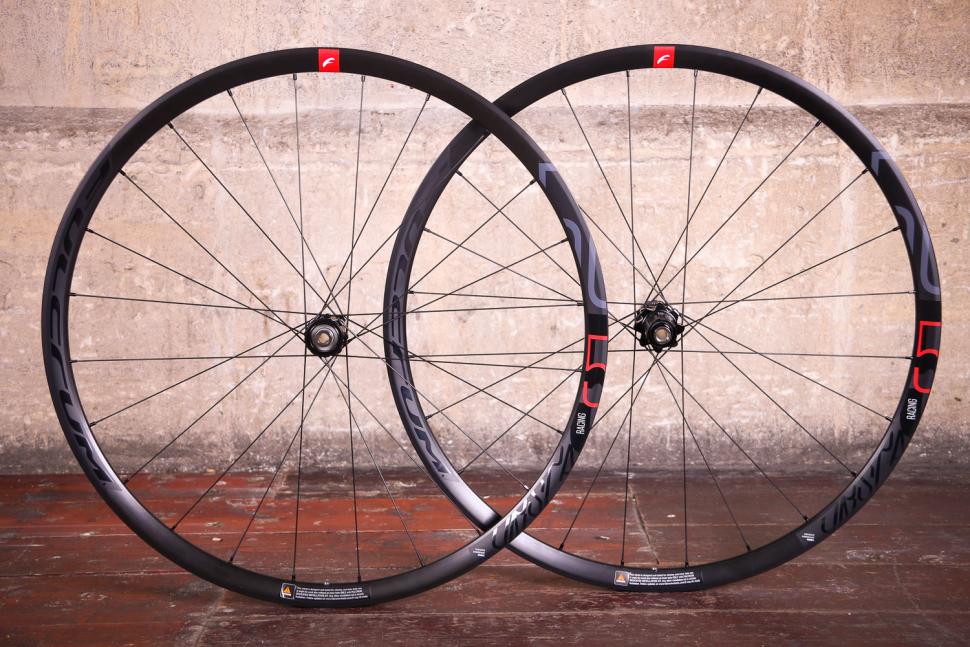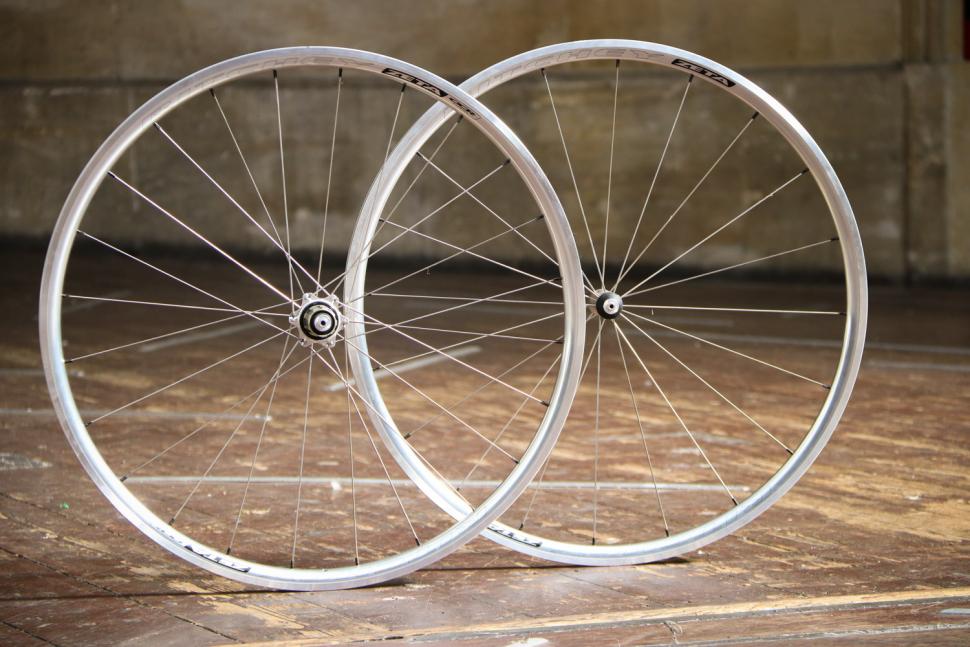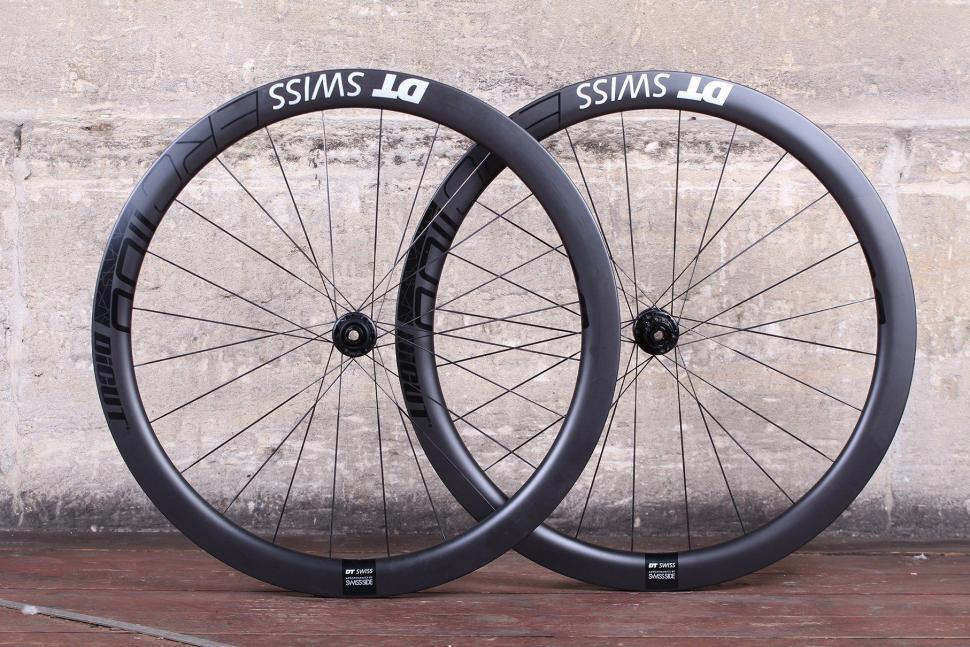One of the most popular upgrades, better wheels (and tyres) can dramatically improve your bike’s ride.
Stock wheels are often heavy and of mediocre quality — upgrading can reduce weight and improve reliability.
If you want to go faster, choose wheels with deep-section rims; aerodynamics is far more important than weight.
You’ve a choice of clinchers, tubulars or tubeless, with matching tyres; each system has pros and cons.
Wheels benefit from the human touch; the best handbuilt wheels are still superior to wheels built entirely by machine.
Upgrading the wheels is one of the first changes many people make to their bikes. Why are wheels so important and how do you choose a better set of hoops?
It's one of the bike industry's guilty secrets: the wheels on even quite pricey road bikes are often a bit ordinary. That means upgrading your wheels can make a big difference to the feel and performance of your bike.
There are several reasons why you might want better wheels. If you're doing a lot of commuting on bad roads (the potholed streets of just about any UK major city for example) you might want a set of beefy wheels for weekday riding, and to switch to something lighter or more aerodynamic for the weekend.
Or you might have decided to keep the run-of-the-mill wheels your bike came with for training and to fit better-performance wheels for sunny days and important events.
>> Read more: All wheel reviews on road.cc
Wheel construction

The basics of wheel construction haven't changed in decades because, quite simply, they work extraordinarily well. A bike wheel can carry hundreds of times its own weight; pretty remarkable structural efficiency.
Your basic tension-spoked wheel consists of a hub that houses bearings so the whole thing can turn easily, a rim for the tyre to sit on and steel spokes under tension that hold it all together.
The tension in the spokes is the vital factor. When you load a wheel, the tension goes down in the spokes between the hub and the ground. As long as it never hits zero, the wheel can support you and your bike.

Nevertheless, wheels have evolved in the last couple of decades, and now usually have fewer spokes and deeper rims, both changes that improve aerodynamics. The spokes themselves may be flattened to better cut through the air too.
Perhaps the biggest change is the use of carbon fiber for rims. That's made possible deep, highly aerodynamic rims with minimal weight penalty. Carbon wheels are still more expensive than wheels with aluminium rims, but prices have been steadily decreasing for the last few years.
Tubulars, clinchers and tubeless

In terms of how tyres mount, there are three types of wheel rim. Rims for tubular tyres — which have the inner tube sewn into the carcass — have a shallow dip where the tyre is glued on. These are the lightest rims, and tubular fans say their soft floaty ride is unparalleled. However, for the vast majority of people the faff of gluing, and the difficulty of fixing a punctured tubular makes them too much hassle.

Clincher or wire-on rims have raised sidewalls with a hook where the tyre bead engages, and the tyre has a separate inner tube. In other words, this is the standard bike rim and tyre we all know and love. Fixing a flat is a simple matter of changing the tube and swapping tyres just requires tyre levers and a pump.
Tubeless tyres are a special case of clinchers. Tyre and rim are manufactured to precise tolerances to enable an airtight seal. The rim has no holes and the tyre is coated internally with rubber so there's no need for an inner tube. Some manufacturers forego the rubber coating and base their tubeless systems around use of sealant. That has the advantage of making them more resistant to penetration punctures, in addition to their natural resistance to pinch punctures.
Weight vs Aerodynamics

If performance is your aim, there's strong evidence that you should put more priority on aerodynamics than weight. Way back in 2001 bike engineer Kraig Willett analysed the forces on wheels and concluded:
"When evaluating wheel performance, wheel aerodynamics are the most important, distantly followed by wheel mass. Wheel inertia effects in all cases are so small that they are arguably insignificant."
That goes against the long-standing conventional wisdom that wheel weight is vitally important to performance because wheels have to be spun up to speed as well as moved along the road.
But you don't do much accelerating when you ride a bike, and even when you do the speed changes involved are relatively gradual. That means you spend most of your time, and therefore effort, simply shoving the air out of the way, and you should choose wheels accordingly.
Pro teams have drawn similar conclusions, which is why you now see far more deep-section wheels in the peloton than you did even ten years ago. Aero wheels are free speed in a breakaway or sprint.
The big disadvantage of deep-section wheels is the effect of crosswinds, which can blow you off track. Some wheels are less affected than others. Zipp's Firecrest shape is widely considered to be among the least problematic thanks to its bulged sidewalls, and most wheelmakers now offer something similar.
Rim width

Just as tyres have become a bit wider in recent years, with the previously ubiquitous 23mm size giving away to 25, 26 and even 28mm tyres, so rims have spread out too. All other things being equal, a wider rim makes for a stiffer, stronger wheel and also makes the tyre effectively a bit fatter.
Wider rims are also claimed to be more aerodynamic because air flows more smoothly between tyre and rim if they are about the same size. Wheel maker Mavic has taken this to its logical conclusion with its CX01 Blades, plastic fairings that fill the groove between its Yksion CXR tyre and Cosmic CXR wheel. The UCI won't let pros use them, but that doesn't affect triathletes and UK time trial riders.
Can we build it?

Wheelbuilding (CC BY-NC-ND Cory Grunkemeyer:Flickr)
If you want your wheels to be durable, then how they were built is just as important as the components that went into them. For wheels to be durable, the tension needs to be high and even. If it's not high then spokes can come loose as you ride because the tension can drop to zero under load. If the tension is not even then the wheel is unlikely to stay round and true, even if it's that way out of the box.
A step in the wheel-building process called 'stress-relieving' also improves wheel longevity by preventing fatigue failure at the spoke heads. If your relatively new wheels start breaking spokes it's a good bet they weren't stress-relieved properly when they were built.
Most wheels these days are built by machines. It's possible to set up wheel building machines to get all of these things right, or very nearly right, but sometimes factories take short-cuts, especially when the objective is to build inexpensive wheels. The less time each wheel spends in the machine, the more wheels the factory can build.

Spokes (CC BY-NC-ND 2.0 Jon Bowen:Flickr)
That's why cheap machine-built wheels have a poor reputation, but if a wheel builder doesn't know what he or she is doing, humans can build poor wheels too. The most efficient way of mass-producing high-quality wheels seems to be to let machines quickly do the spadework and then finish them by hand, as Joe Graney found when Santa Cruz decided to build its own wheels.
Alternatively, you can get top-quality wheels that have been built by hand from start to finish, either off-the-peg or custom built. Barnoldswick parts-meisters Hope have been making well-regarded wheels for years, including road wheels, while Hunt Bike Wheels is a new entrant in the field. You'll find wheels built by several others in the selection below.
If you want something truly special, a wheelbuilder who really knows their stuff can help you choose exactly the right combination of hubs, rims and spokes for your needs. The doyen of this approach in the UK is probably Liverpool's Pete Matthews whose resume includes building wheels for Tour de France King of the Mountains Robert Millar, legendary rouleur Sean Yates and comedian Alexei Sayle. Many good bike shops have a similar if less storied figure lurking in the workshop, quietly crafting wheels that last until the rim sidewalls wear out.
Names to look for
The major wheel brands nevertheless produce good wheels, by and large. Riders report thousands of happy miles on wheels by Mavic, Bontrager, Shimano, Reynolds, Zipp, DT Swiss and many others. Here are some of our favourite wheels from the last couple of years.
The best road bike wheels
Prime BlackEdition 50 Carbon — £699.99
Prime's BlackEdition 50 Carbon wheels vastly outperform their price-tag, with stable rims, great braking, smooth hubs and easy tubeless setup. The rims are designed to work best with wider tyres. The 19mm internal width allows the tyre to be nice and fat and our tester was very happy running these at around 55psi, especially with 28mm tyres. The 27.5mm external width, in theory, creates a wind-cheating profile. Until we get a wind tunnel, all we can say is that these didn't hold us back. On the flat, they hold speed easily and glide over poor surfaces.
Read our review of the Prime BlackEdition 50 Carbon wheels
Just Riding Along Lark Light — £414.80
The Lark Light Road wheels from UK brand JRA (Just Riding Along) certainly live up to their name, weighing just 1,460g for the set. They're very responsive and JRA hasn't sacrificed durability to save the grams either. It's the perfect package for the rider who wants a classically styled, lightweight set of wheels for racing or training.
Losing 250g from a wheelset always seems to make much more of a difference to how the weight of the bike feels compared with dropping the same amount elsewhere, so swapping to the Larks from a set of winter rims made impressive differences to acceleration and climbing.
The JRA Light Road hubs run very, very smoothly on their stainless bearings and the pick-up on the freewheel is fast and precise, which all adds to effortless rolling whether on the flat or rolling terrain.
Read our review of the Just Riding Along Lark Light wheels
Token Prime Ventous Carbon Disc — £1,099.99
The build quality of the Prime Ventous Carbon Disc Road wheelset is excellent, they look great, perform really well and are pretty good value too. tester Sean Lacey rode them from Land's End to John o'Groats and found them smooth and quiet (including the freehub). They picked up well and gained speed noticeably quicker that the Ultegra wheels he'd been running; the ride was much better.
The wheels were stiff and did have a little give under pressure but weren't fazed at all by fast decents or hard climbs. They continued on at pace whatever the gradient, the acceleration when cracking on at the base giving a welcome extra bit of speed to carry up.
Read our review of the Token Prime Ventous Carbon Disc wheels
Find a Token dealer
Vision TriMax 30 KB — £569.46
Vision's TriMax 30 KB tubeless-ready wheels are built to last, look great and stay that way thanks to a clever surface treatment. Weight-weenies might find them a shade heavy, but that's far less important than durability and reliability.
These are probably the most unobtrusive wheels I've ever tested – and that's a very good thing. For a start, they're straight and true, and the spoke tension is decent, which will help them stay that way. They're laterally stiff enough that I couldn't get them to rub on the brakes, even though I run the blocks close to the rim so they come on at a touch. They're unaffected by sidewinds because they're only 30mm deep, enough to give them a slight aero advantage over old-school square rims, but not enough to affect handling when it's windy. Even the freewheel noise is relatively quiet. Very easy wheels to live with.
Read our review of the Vision TriMax 30 KB wheels
Find a Vision dealer
Just Riding Along Gecko — £850
Just Riding Along's (JRA) Gecko Carbon Wheelset is a very impressive set of hoops designed to take on the constant knocks and vibrations the roughest gravel tracks can throw at them, while still being so light that they won't hamper your performance on the road. With a claimed sub-1,400g weight and all the strength you could need, it's also pretty amazing that they come in at well under a grand.
Read our review of the Just Riding Along Gecko wheels
Bontrager Aeolus XXX 4 TLR — £1,906.80
Bontrager's Aeolus XXX 4 TLR clincher wheels are stiff, lightweight and steady in use and offer good braking in both wet and dry conditions. This is a great all-round aero wheelset that's suitable for a wide variety of conditions and it's light considering the rim depth, ours coming in at 1,420g for the pair.
The first thing I noticed about these wheels is their stiffness. With the brake pads set up stupidly close to the rims I could get some rub when throwing the bike around in a massive gear, but I got virtually none in normal use, not even when sprinting or leaning hard into a tight corner. No worries at all there.
The next thing to mention is their stability. Some aero rims can get knocked about by sidewinds, even when the yaw angle is quite shallow. Fluctuations in the speed and/or direction of the wind can have a large effect on the steering, making your bike's front end feel like a handful, upsetting your confidence and ultimately affecting your speed. The Aeolus XXX 4 TLRs have behaved well on super-windy rides.
Read our review of the Bontrager Aeolus XXX 4 TLR wheels
Find a Bontrager dealer
Mavic Ksyrium Elite UST — £454.99-£478.99
For 2018 Mavic's highly dependable all-rounder, the Ksyrium Elite, has become tubeless, using the French company's UST system like much of the range. The wheels have maintained their lightweight, durable persona from previous models and are still great to ride whether you are racing or tackling the club run, with a little bit of future proofing. A welcome addition is that the Yksion Pro UST tyres are now among the best tubeless tyres you can buy, and Mavic's Road UST system makes for smooth and simple fitting of tyres with just a standard track pump.
Read our review of the Mavic Ksyrium Elite UST
Find a Mavic dealer
Fast Forward F4R FCC Tubeless DT 350 — £1,159.99
These Fast Forward F4R FCC Tubeless Ready wheels are seriously good for their relatively sensible price tag. They're stable in strong winds, quick to spin up to speed and also quick to stop. What's more, you get great hubs and high-end pads. It's a great package.
Read our review of the Fast Forward F4R FCC Tubeless DT 350
Fulcrum Racing Speed 40C Carbon — £1,679.99
The Fulcrum Racing Speed 40C Carbon wheels are the company's high performance offering. They offer buttery smooth ceramic bearings, stable rims and brilliant braking. The only thing not to love is the price.
Read our review of the Fulcrum Racing Speed 40C Carbon
Find a Fulcrum dealer
DT Swiss PRC 1400 Spline 65 — £1,338.99
The new DT Swiss PRC 1400 Spline clincher wheels come with deep section 65mm rims for aerodynamic efficiency. They're well made and come with excellent internals, plus you can run them tubeless.
You are getting some seriously good wheels for your money here. Granted, these don't offer quite the aero performance of DT Swiss's ARC 1100 Dicut wheels but the PRCs feature excellent components, they're stiff, braking is good and, for their depth, they feel pretty stable in most conditions. This is a reliable high-performance wheelset that puts in a great performance in a variety of conditions.
Read our review of the DT Swiss PRC 1400 Spline 65 wheels
Find a DT Swiss dealer
Hunt Superdura Dynamo Disc — £539
If you're looking at a dynamo system for your road bike then the SONdelux hub dynamo is pretty much the best out there for low resistance and weight, and it's renowned for great build quality which is matched by the rest of the components on these excellent Hunt wheels. Considering how much the dynamo costs on its own, the price is excellent too. They might be a bit much for the odd night ride, but if you rack up the miles after dark they're an investment worth considering.
Read our review of the Hunt Superdura Dynamo Disc wheels
AlexRims CXD4 — £339.99
AlexRims knows a thing or two about making rims (the clue's in the name), so it's not a surprise that it's moving into the wheelset market. And if these CXD4s are anything to go by, you should definitely look at them as an option if you're upgrading your bike or speccing a new build.
On the road the wheels feel nice and stiff, with no obvious flex either from sprint efforts or heavy cornering. The bearings run smoothly, and whipping the cassette off showed that there's not very much notching on the alloy freehub body. The 1,580g all-in weight is pretty good for a disc wheelset at this price. Shimano's RX31s are 380g heavier for the same kind of money, and similar-weight wheelsets from the likes of Cero, Kinesis and Hunt come in at least £50 more expensive.
Read our review of the AlexRims CXD4
Find an AlexRims dealer
Hunt 3650 Carbon Wide Aero — £899
Going wide and deep, Hunt has created a set of fast, durable and light wheels in the 3650 Carbon Wide Aeros. With a specification of high-end parts and great build quality, Hunt isn't trying to reinvent the wheel but it is certainly refining it to a level of performance unheard of on sub-£1,000 wheelsets.
The name 3650 comes from how deep they are: 36mm at the front and 50mm at the rear. It's quite a common combination for many riders as it is so adaptable to various weather conditions and the topography of your chosen route.
The front gives you a slight aero advantage over a more standard box rim shape without getting battered around by crosswinds, and it also keeps the weight down for climbing.
Read our review of the Hunt 3650 Carbon Wide Aero wheels
DT Swiss PR 1400 Dicut OXiC — £661.50
The PR 1400 Dicut OXiC wheels feature a ceramic coated rim surface that provides reassuring braking performance in a range of conditions, making them ideal for year-round cycling in the UK.
The application of a hardwearing ceramic coating on the rim is nothing new: Mavic used to produce a highly regarded ceramic back in the day. DT Swiss, though, reckons its new OXiC treatment is able to deform with the rim, which means the coating can't become detached from the aluminium, a problem that plagued Mavic ceramic rims. DT is confident the ceramic coating won't wear our over the normal lifespan of the rim, and it won't fade in the sun.
Read our review of the DT Swiss PR 1400 Dicut OXiC wheels
Find a DT SWiss dealer
Shimano Dura-Ace C24 Carbon Clincher — £584.79
I've been running the C24s with 25mm Continental Grand Prix 4000 tyres (Shimano advises that you use tyres ranging from 23mm to 28mm with these wheels) and they've been very quick, accelerating fast, and the ride quality is hard to fault.
The C24s, which have just been given a graphics/aesthetics update to match Shimano's new R9100 components, have the shallowest rim heights of any wheels in the Dura-Ace range: the front is 21mm and the rear is 24mm. They're not particularly wide either: 15mm internal, 20.8mm external, whereas the new C40 and C60 clinchers are both 17mm internal and 24mm external, following the trend towards more width.
Read our review of the Shimano Dura-Ace C24s
Find a Shimano dealer
Hunt 30Carbon Gravel Disc — £899
I've been thrashing the Hunt 30Carbon Gravel Disc wheels around the roads and bridleways of the south west, as well as using them for a touring trip to Cuba where they endured all kinds of surfaces, pot-holes and being lashed to roof-racks with string. And I like them, a lot.
As the name suggests, the 30Carbon Gravel Disc wheels are aimed at the fast-growing new gravel/all-road/adventure bike category. Gravel bikes are aimed at riders who want to go quickly on the road, with the freedom to take a turn off the tarmac and explore further into the wild than you could on a traditional road bike. They're typically built tougher than a road bike, and consequently heavier. If you're looking for an upgrade to your gravel bike, wheels may be on your list, and with a weight of less than 1,500g, these are likely to be quite a bit lighter than most stock wheels.
Read our review of the Hunt 30Carbon Gravel Disc wheels
BORG22T Disc Road/CX tubular — £380
The BORG22T wheelset features 22mm-deep aluminium tubular rims and triple butted Sapim Force spokes laced onto Miche Syntium DX hubs. It's not a flashy package, but it bats well above its price tag – it's tough, fast and will suit riders looking for a brilliant cyclo-cross wheelset.
Sometimes a product will genuinely surprise you. Take a look at the spec list of the BORG22T wheels and you'd be forgiven for not expecting much, and certainly not at this price. But I put them on my bike and was surprised to find they're excellent. I wouldn't expect to find a tubular disc wheelset below the £1,000 mark; finding such a great set of wheels for £380 has made me question why I'd spend more.
Read our review of the BORG22T Disc Road/CX tubular wheels
Roval CLX 50 Disc — £1,848
Since Roval parent Specialized introduced the Roval Rapide CLX 40 wheels two years ago, they've been busy and the CLX 50 wheels are the CLX 40s' spiritual replacement. They're a marked improvement, too, with better aerodynamic performance and an impressively low weight for the disc brake version here.
The aim for the new Roval CLX 50 was to marry the aero performance of the deeper section CLX 64 with the lightness of the shallower CLX 32. At 1,415g with a 50mm-deep rim and disc brake hubs, they would appear to have achieved that objective.
This is a very attractive weight in a hugely competitive wheel market. They're not much heavier than the £4.8k Lightweight Meilenstein C Disc wheels, for example, and only a smidgen heavier than the so-called lightweight, shallow, rim-braked FFWD F3R carbon clinchers. You can have aero and low weight it would seem. And a Zipp 404 Firecrest Disc wheelset? That's a comparatively portly 1,715g.
Read our review of the Roval CLX 50 Disc
Find a Roval dealer
Halo Evaura Uni 6D — £348.98
Halo seems very proud of its new Evaura Universal 6D 700C wheelset, and quite rightly. These are well-made wheels that can be adapted for a variety of cycles and purposes. The ride quality is excellent, the weight modest and – despite the dishing needed to make it disc-brake compatible – it proved impossible to provoke them into twisting or flexing.
The idea behind this wheelset is to make it as adaptable as possible to the new rash of wheel and braking standards that is spreading across the industry. While most conventional road frames take a 130mm rear axle, disc brake-equipped bikes are commonly adopting the 135mm found on mountain bikes. (Mountain bike rear axles are themselves now getting longer, but that's another story...)
Read our review of the Halo Evaura Uni 6D wheels
Find a Halo dealer
Fast Forward F3R Full Carbon Clincher Wheels — £1,799.99
Fast Forward F3R Full Carbon Clincher wheels are a lightweight option that provide excellent acceleration and a high level of stiffness, although the lack of aero credentials might put off some who aren't pure climbers.
Fast Forward bills the Full Carbon Clincher as a wheelset that's particularly suited to climbing. The carbon rims are 30mm deep and 22.4mm wide with quite a rounded profile and a blunt inner edge – far more U-shaped than V-shaped.
Read our review of the Fast Forward F3R Full Carbon Clincher wheels
Find a Fast Forward dealer
Knight Composites 65 wheels — £2,000
The Knight 65 Carbon Fibre clinchers offer very good stiffness, but their real skill is in cutting through the air at high speeds and feeling stable with it.
These wheels – Knight's own rims laced to DT Swiss 240 hubs – have a whole lot going for them. Okay, at 65mm deep they're never going to be particularly light, our pair coming in at 1,680g (including rim strips and skewers), but that's not unusual. For comparison, Zipp's 404s are a claimed 1,505g (you also need to factor in the weight of the rim strips and skewers) and Bontrager's 70mm-deep Aeolus 7s are a claimed 1,610g.
It's when you fire the Knight 65s up to speed that things get impressive. As tester Mat Brett put it: "I have a few routes that I ride regularly as personal time trials for reviewing bikes and kit – rolling rather than hilly – and I've used these wheels to help achieve consistently fast times over several weeks and in a wide variety of conditions. I measure power every ride and my view is that these wheels are offering impressive speeds for the wattage I'm putting out. It's unscientific and highly anecdotal, so take it or leave it, but this is my experience."
Read our review of the Knight Composites 65 DT Swiss 240 wheels
Find a Knight Composites dealer
DT Swiss RRC 65 Dicut clinchers — £1,999.98
They might be a lot of money but these DT Swiss RRC 65 Dicut clincher wheels are fast and stable, and they offer a good braking performance too.
These wheels are at their best when slicing along at high speed. They maintain pace beautifully with an appreciably lower resistance than shallow section rims. The RRC 65s also accelerate well, especially considering their 65mm rim depth. Weighing 745g (front) and 885g (rear) – excluding skewers; combined weight is 1,630g (DT's official total weight is 45g lower) – they spin up to speed with little fuss. For comparison, Zipp's 58mm deep 404 Firecrest Carbon Clinchers have claimed weights of 725g and 895g (1,620g total).
Some people might consider 65mm a little deep for general road use but we rode with these wheels on both a road bike and more occasionally on a TT bike for six weeks and they were superb. We really rate these wheels highly, and not just for racing against the clock.
Read our review of the DT Swiss RRC 65 Dicut clinchers
Find a DT Swiss dealer
Vision Team 35 — £233
Vision's Team 35s are competent and durable entry-level race wheels, with the added bonus of being very comfortable for a set of semi-deep-section alloy clinchers. The black anodised finish gives them a cool stealth look too.
The Team 35s are a revamped version of Vision's long-standing T35 model, and with a recommended retail price of £229.95 they sit right at that level of a first serious performance upgrade for a lot of bikes.
At first glance they seem a bit porky at 1,820g, especially considering the quoted weight is some 100g less than that, but the good thing is they never feel sluggish out on the road. You notice it a little if things get really steep or you ask for some rapid acceleration from a standing start, so if you're searching for a climber's set of wheels, look elsewhere.
Otherwise, the Team 35s are hard to knock. Considering the depth of the alloy rim, you'd expect them to feel harsh, but they don't.
Read our review of the Vision Team 35 wheels
Find a Vision dealer
Swiss Side Hadron 625 — ~£1,200
"Hur hur hur your wheels are called Hard... oh no, wait, it's Hadron." To Swiss ears, the name may well conjure up the crowning peak of European scientific endeavour, but it's perilously close to something that provided regular amusement to the Sunday morning crew back at home. That's as may be, but the Swiss Side Hadron 625s are stonkingly good wheels, offering arguably the best performance in this price bracket on the market today.
They use a hybrid aluminium-carbon rim to give aluminium-rim brake performance and class-leading aerodynamic performance, at a price way below the big players like Zipp and Enve. And by god they sound good.
Read our review of the Swiss Side Hadron 625 wheels
Superstar Components Pave wheels — £299.99

The least expensive wheels we've ever given four and a half stars, the Superstar Pace 28s demonstrate that custom handbuilt wheels can be competitive on weight and reliability with any factory wheels. They have wide rims in the modern style and are built on reliable Icon hubs. They're comparable to substantially more expensive wheels from other manufacturers; light enough to race on while still managing to be as tough as old boots, and look how shiny they are.
Read our review of the Superstar Components Pave wheels
Hunt 4Season Aero V2 — £319
Hunt's entry-level road clinchers look like an excellent choice. They succeed the now-discontinued 4Season Dura Road wheels which we liked a lot, and like those wheels, these look to be a good first upgrade over heavy stock wheels, or as a good quality winter or all-round option, they're right on the money.
The 4Season Aero V2 wheels have the same hubs. We had no issues with the 4-pawl freehub, nor with the sealed EZO bearings. Everything ran smoothly in spite of being subjected to some biblical conditions. The supplied skewers are an external cam, with a nylon insert instead of the brass one you get on the more expensive Hunt wheels, but they do the job without any fuss.
Read our review of the Hunt 4Season Dura Road
Find a Hunt dealer
Pro-Lite Bortola A21 wheels — £272.99

The 1,540g weight of these wide, tubeless-ready wheels is impressive for an aluminium wheelset even if that is about 65g over the claimed weight. With the Bortolas Pro-Lite haven't sacrificed strength or durability to achieve it, it's more of a by-product of well chosen, proven components.
On the road, they're smooth and comfortable, but light enough to reward a little out of the saddle dig on a steep section while climbing.
Overall the Bortolas are perfect all rounder wheels that only really lose out in terms of aerodynamics due to that shallow rim.
Read our review of the Pro-Lite Bortola A21 wheels
Pro-Lite Revo A21W — £269.99
Road disc and gravel wheels are getting better, lighter and cheaper, and right at the forefront of that trend are the Pro-Lite Revo A21s. At 1,650g, with a Centerlock option, thru-axle compatibility and a wide track rim, they're a bargain, and pretty future-proof too.
Pro-Lite builds all its wheels by hand and the Revos arrived nice and true, with even spoke tension. The spokes are bladed and triple butted, and Pro-Lite uses a brass washer at the spoke head to better distribute the forces there.
The Revos use a 21mm deep rim (hence the name), which is 23.8mm wide externally and 19mm internally. That makes it ideal for 28-32mm tyres, although 25mm rubber and bigger chamber tyres will be fine too.
Read our review of the Pro-Lite Revo A21W
Find a Pro-Lite dealer
Stan's NoTubes ZTR Grail Team — £457.95
We've been hugely impressed with these wheels. With 25mm slicks at high pressures they're fast on the road, and they've proven extremely tough when riding with knobbly tyres at low pressures off-road. They're a decent weight, the hubs are easily interchangeable to different axle standards, and the company's Bead Socket Technology (BST) means getting a tubeless tyre inflated is a cinch.
The Grail rims are wide: 24mm on the outside, 21mm on the inside. The rims are also quite deep, 24.5mm, making them the company's deepest – and therefore more aero – rim to date. They're constructed from aluminium and weigh a claimed 460g apiece. The BST rim profile features a shallow seating area so the tyre bead locates right up against the side of the rim. Getting a Schwalbe One tubeless tyre to inflate was ridiculously easy – a slosh of sealant inside and a track pump to inflate the tyre.
If you want a disc- and tubeless-ready wheelset with a wide rim profile to make the most of the growing number of wide tubeless tyres, the Stan's NoTubes ZTR Grail Team wheels combine a competitive price, decent weight and impressive performance. Add in the easy tubeless compatibility and axle versatility, and they're seriously worth considering.
Read our review of the Stan's NoTubes ZTR Grail Team
Find a Stan's NoTubes dealer
Edco Optima Roches (22mm) Tubeless Ready Wheels — £400

Traditional looks meets modern width in these wheels from Swiss-based Edco, which have 22mm wide rims and are ready for Tubeless tyres like those offered by Hutchinson, Bontrager or Schwalbe.
There are a lot of clever touches to these wheels like the MultiSys freewheel body, designed to accept both Shimano/SRAM and Campagnolo cassettes so you don't need new wheels if you ever change gearing allegiance.
These wheels ride well, are a sensible 1,571g and come with a whopping eight-year guarantee.
Read our review of the Edco Optima Roches (22mm) Tubeless Ready Wheels
Find an Edco dealer
Swiss Side Hadron 485 — ~£1,200
Hadron wheels (named after that big circular tunnel near Geneva, of course) are available in rim depths of 48.5mm, 62.5mm and 80mm (front)/85mm (rear). All share the same fundamental construction, with aluminium rims and carbon fairings. Swiss Side says it's done an enormous amount of work to perfect the aerodynamic design of these rims, focusing on aerodynamic drag and also minimising the sensitivity to side-winds.
They've performed well in a wide variety of riding. We won't pretend that we can accurately determine the difference compared with other quality aero wheels of a similar depth, but they certainly feel like they're in the same ball-park, holding speed really well and making a rather satisfying hum in the process.
Read our review of the Swiss Side Hadron 485
Find a Swiss Side dealer
Fulcrum Racing Quattro Carbon DB — £721.99-£859.99
The Fulcrum Racing Quattro Carbon DB wheels could well redefine the modern bicycle wheel. They're bang on trend for a broad range of today's disc brake-equipped bikes and promise the trinity of light, fast and strong.
First, they're the right material: carbon fibre, with a 3k core and unidirectional surface. And while Fulcrum doesn't tout them as tubeless ready, they are, with only the valve hole in the bed of the 40mm-deep aero section rims.
The broad carbon rims are laced with 18 spokes in the front and 21 in the rear – a number low enough to keep the weight down, but high enough to make the wheels feel bombproof.
Paradoxically, they ride like function-specific race-day wheels, all revved up and raring to rip up the road, and so, naturally, you expect them to be fragile and delicate, with a need to be guarded from harm and children's sticky fingers. In reality, they're street tough and ready for couple of pints and a scrap.
Read our review of the Fulcrum Racing Quattro Carbon DB
Find a Fulcrum dealer
Spin K2 Carbone XLR38 25mm Fat Boy Clincher wheels — £990.00
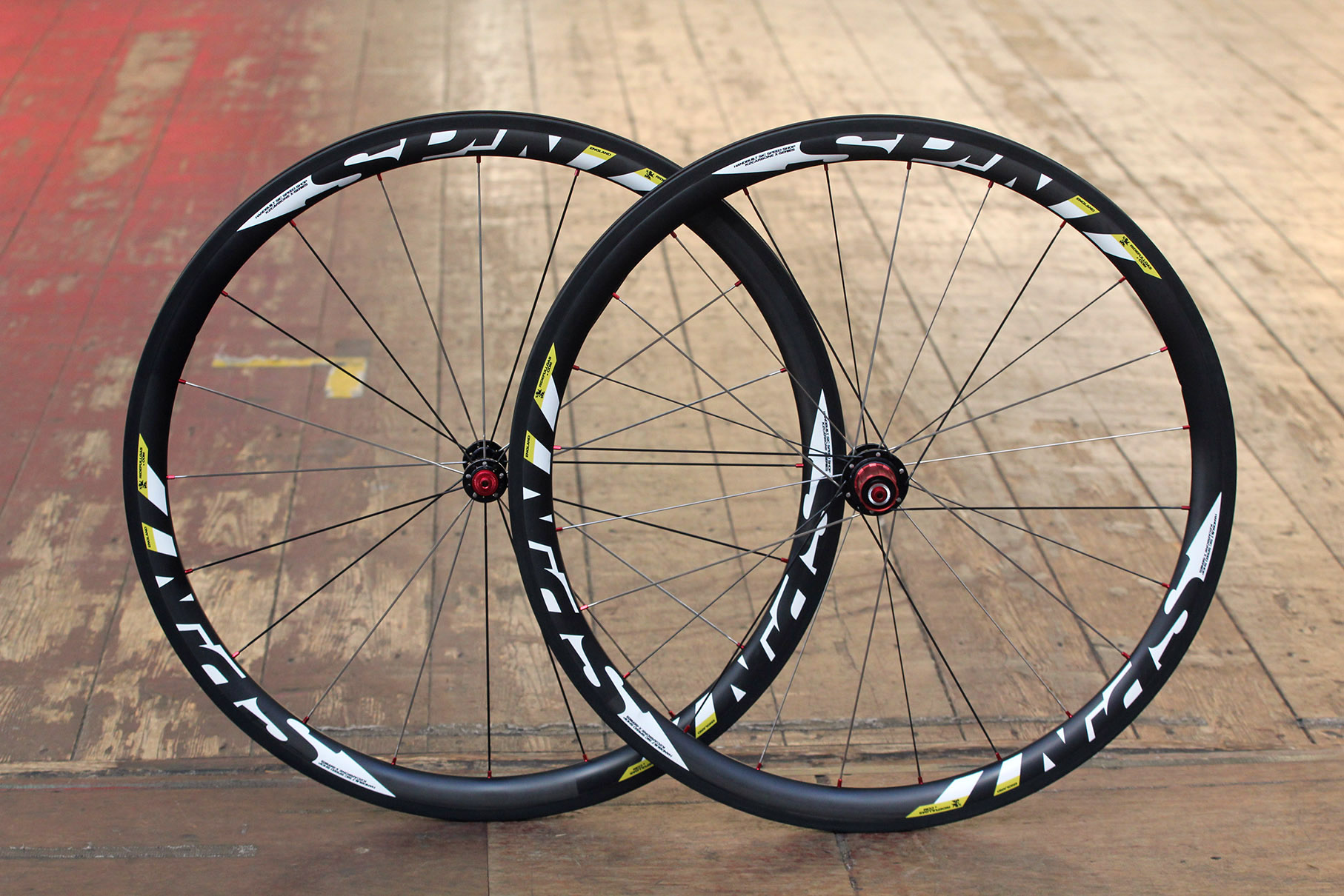
The closest equivalent to these wheels in the current Spin range is the DM8 Custom Shop Pro ThirtyEight Super Fly Boy. They're still 38mm deep, but now wider to give better support and shape to 25-28mm tyres.
The XLR38s offered bags of speed with a fat rim profile reminiscent of a Zipp or Enve but at a fraction of the price. We expect theSuper Fly Boys to be just as good, making them an ideal upgrade for anyone looking to invest in their first deep section carbon wheels.
Spin offers a choice of rim depths, laced to its own SPN Precision hubs. With the 38mm rims, they weigh 1500g per pair. That's a very competitive weight, certainly for the price. You won't get much lighter unless you're prepared to spend quite a lot more money. Braking with the supplied QuickStop Black Shadow brake blocks was excellent.
Read our review of the Spin K2 Carbone XLR38 25mm Fat Boy Clincher wheels
Specialized Roval Rapide CLX 40 — £1,199.00
About road.cc Buyer's Guides
The aim of road.cc buyer's guides is to give you the most, authoritative, objective and up-to-date buying advice. We continuously update and republish our guides, checking prices, availability and looking for the best deals.
Our guides include links to websites where you can buy the featured products. Like most sites we make a small amount of money if you buy something after clicking on one of those links. We want you to be happy with what you buy, so we only include a product in a if we think it's one of the best of its kind.
As far as possible that means recommending equipment that we have actually reviewed, but we also include products that are popular, highly-regarded benchmarks in their categories.
Here's some more information on how road.cc makes money.
You can also find further guides on our sister sites off.road.cc and ebiketips.
Road.cc buyer's guides are maintained and updated by John Stevenson. Email John with comments, corrections or queries.









